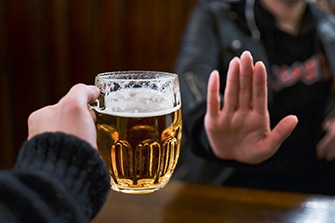How to Quit Drinking
Alcohol is everywhere — restaurants, corner liquor stores, bars, college, celebrations, sports events, weddings, the holidays and more. It can seem nearly impossible to escape alcohol since drinking culture is so embedded in American life. Millions of people suffer from alcohol use disorder and aren’t able to maintain acceptable drinking habits, instead, becoming addicted and suffering from a chronic, progressive disease that can ruin their lives. Luckily, it is a treatable disorder, and learning how to quit drinking is possible.
Make the Decision to Quit Drinking
The most important step in learning how to quit drinking is to make the decision to stop. Chances are, you are well aware that your drinking habits have gotten in the way of living a normal, healthy life. But, is it alcoholism or just a period of heavy drinking?
Some signs you need to make the decision to quit drinking include:
- Drinking to feel “normal”
- Not being able to slow or stop use
- Driving a vehicle while impaired
- Drinking alcohol at inappropriate times, such as in the morning
- Blacking out often
- Feeling hungover often
- Hearing family and friends express concern
- Being unable to stop after one or two drinks
- Experiencing negative consequences such as poor performance at work or school, difficulty in relationships or drinking-related legal issues
Seek Professional Help to Quit Drinking
Once you have made the decision to quit drinking, it is important to seek help. By now you know that it is difficult for you to stay sober, even if you badly want to quit. Quitting cold turkey without professional help is nearly impossible.
Learning how to quit drinking is much more than just simply abstaining from alcohol. It involves learning behavioral patterns, finding new coping skills, managing triggers, dealing with underlying mental health or trauma issues, and finding new outlets to relieve stress and anxiety.
If you are not sure where to start looking for professional help, our admissions specialists are available 24 hours a day to confidentially answer any questions you may have. They can also help you figure out any logistics, negotiate payment with your insurance and fully explain the treatment process in detail so you know exactly what to expect.
Think of the Benefits
Giving up alcohol can seem like a failure to many people. The stigma surrounding alcohol use disorder makes individuals feel like they aren’t able to “handle” their liquor, like they are inadequate in some way, or like they can’t have fun anymore. However, it is important to remember that these feelings are only “normal” because of the stigma that society has placed on alcohol use disorder. The reality is that there are many benefits to giving up alcohol to look forward to that far outweigh these feelings.
- You will improve your relationships. There is a good chance that your drinking habits have gotten in the way of relationships, including with your children, spouse, friends or family. Learning how to quit drinking will be the beginning of fixing those relationships.
- Your body will be healthier. Alcohol causes a number of health issues, including heart problems, liver failure, extra fat, and heightened anxiety. By quitting alcohol, your health will improve and you’ll have more energy, sleep better, and be less stressed.
- You will save money. If you calculate the expense of regular and excessive drinking, you might be shocked. On average, a person suffering from alcohol use disorder may spend up to $200 a week on alcohol. This doesn’t include any money spent on alcohol-related incidents such as accidents, a DUI or injuries.
- You’ll be able to focus. Alcohol numbs the brain. When you give up alcohol, your brain’s neurons and neurotransmitters are able to communicate easier. This causes individuals to feel better, concentrate better, focus more and you’ll be able to start reversing what brain damage alcohol has caused.
Keep Up with Aftercare
Once an individual has been through the treatment process and is now living a life free of alcohol, it doesn’t mean that they have been cured and the work ends. Overcoming alcohol use disorder can be a lifelong struggle. Individuals encounter triggers or struggles that they didn’t know they had even years after becoming sober. That is why it is so important to keep up with an aftercare program to avoid a potential relapse, even if you are feeling good about your sobriety.
Aftercare includes:
- Ongoing outpatient treatment
- Attending meetings regularly
- Having a sober coach or a sober companion
- Checking back into a treatment center if symptoms become too much to bear
- Setting boundaries with friends and family to keep accountable
- Making self-care a priority and keeping stress levels low
About Cliffside Malibu
Learning how to quit drinking can be a lifelong struggle. There is no one-size-fits-all method of quitting alcohol; instead, it is important for individuals to find what works best for them.
Since no two addictions are the same, Cliffside Malibu offers an individualized treatment plan for each and every client. We are committed to providing the best care possible through.a continuum of care including medically supervised detox, residential treatment, day treatment, and outpatient services. Our program includes not only evidence-based behavioral therapy but family therapy and holistic therapy, as well. Whether an individual is suffering from substance abuse and/or alcohol addiction, our programs are designed and structured to be a supportive environment in order to maintain sobriety.
In addition to world-class treatment, Cliffside Malibu offers luxury accommodations, a serene environment, five-star dining, and plentiful amenities. We understand that addiction treatment is a rigorous process. Therefore, we provide for your comfort and relaxation at every turn, allowing you to rejuvenate, to meet the demands of treatment with your greatest energy and attention.
For more information on Cliffside Malibu, visit cliffsidemalibu.com
